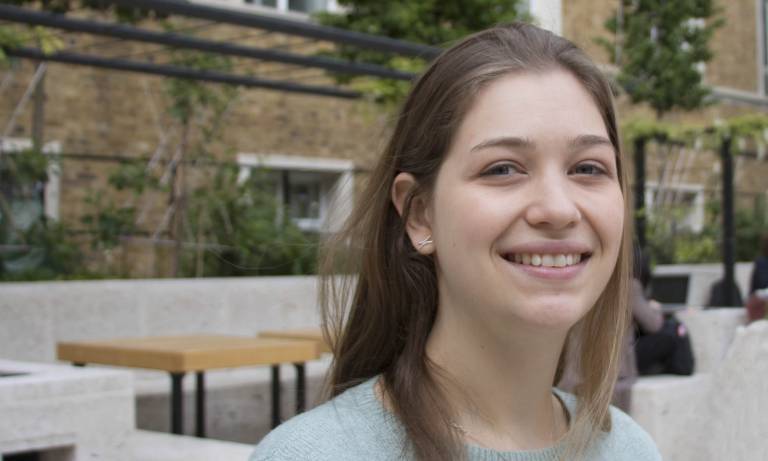Philippa Harding, PhD Ophthalmology

1. What is your educational background?
I did my undergraduate degree in Biology at the University of Bath, including a placement working as a Research Assistant studying bird behaviour in Cape Verde. After finishing my degree, I worked for a year as a research assistant at the Wellcome Sanger Institute, working in high-throughput gene editing of stem cells, as well as the human cell atlas project.
2. What are your motivations for pursuing a PGR?
I embarked on a PhD so that I could grow as a researcher. I wanted to learn how to plan a research project and carry out the required experimentation, including facing challenges and problem solving to obtain meaningful results. I also wanted to do research which had a role in helping people who could benefit from me investing my skills and time.
3. Why did you apply to UCL Brain Sciences?
I applied to UCL because it is a world-renowned university, with an excellent reputation for research. I also applied to UCL for the opportunity to study in the buzz of London and take advantage of the excellent opportunities for students. I also chose to study at UCL because the course was perfect for me, as it was directly focused on the field of research I am interested in, and would allow me to develop the research skills I wanted to pursue.
4. What is the best thing about your course?
The best part of my course is working with inspiring academics, and absorbing their insight on my ideas. I also find the chance to learn from experience extremely rewarding, and I am learning so much about how to be a better researcher every day.
5. What do you find interesting about your field of study and what inspires you?
I find stem cell technology fascinating, because it is such a new technology that we are still exploring what is possible, and breakthroughs are happening on a daily basis, particularly in disease therapies. What inspires me most is talking to people who I am trying to help, who are so grateful that I am investing time to understand their disease and develop new ways to improve their wellbeing.
6. What is it like studying in London and how do you think it has benefited your studies?
Studying in London is incredible, there are unlimited opportunities on your doorstep, and you are surrounded by diverse and interesting people. Since moving here, I have attended multiple conferences, which has let me hear presentations by world-leading academics, which has challenged and inspired me.
7. Has there been an element of your degree programme that has impressed you or been particularly valuable?
One of my best opportunities in my PhD has been working directly with Moorfields Eye Hospital, including engaging with patients. This connection adds an extra dimension to the research I am doing as I can meet the people I am trying to help, and learn about what they want out of my research.
8. If you received funding either through a scholarship, award, studentship or bursary, how has it helped you achieve your aspirations and what impact has it had on your studies?
I received studentship funding through Moorfields Eye Charity, which has allowed me to realise my aspiration to do a PhD, which I would never have been able to do, especially not in London, without their generous funding.
 Close
Close

